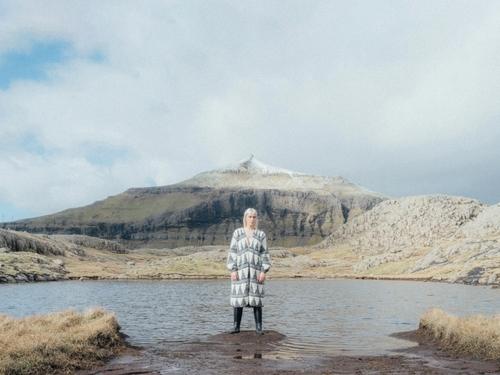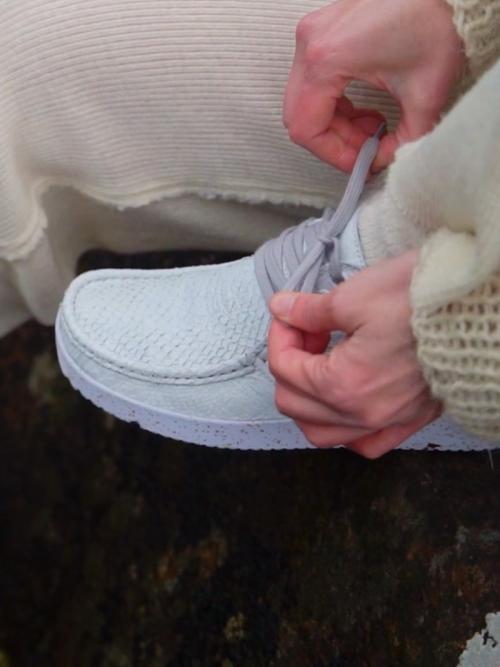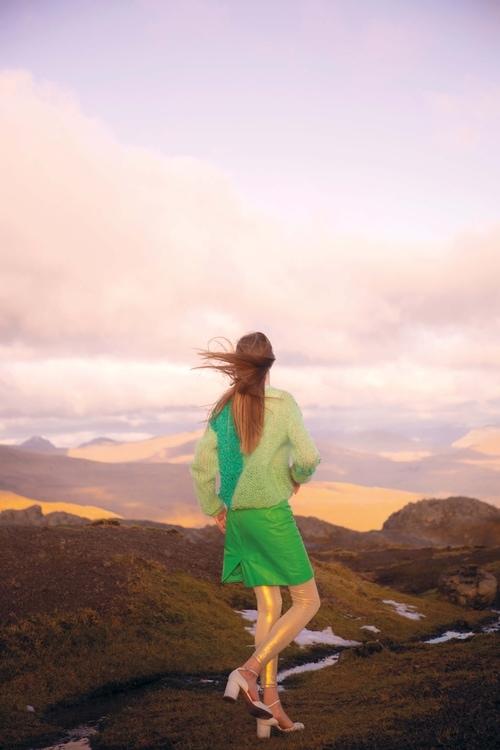nadda is knitting for her life
January 16, 2020
Among Guðrun og Guðrun’s knitting-workers in Jordan, there are also Syrian Refugees. One of them is Nadda, who arrived in Jordan in 2012. Her household consists of six people and Nadda’s income from knitting and cooking is essential to the family.
Nadda and her family are among more than a million Syrians, who fled their country and settled in Jordan after the outbreak of the Syrian Civil war in 2011. She and her two daughters arrived in Jordan in 2012, while her husband and their two sons stayed behind. In 2016 her husband, Awli, joined her in Jordan and at the same time, one of her sons managed to get to Sweden. The last son is still in Syria, stuck in the army.
In the small family apartment in Amman, Nadda lives with her husband, their two daughters and two nephews. But the income of the family is very restricted, because her husband can’t find a job due to age. Nadda knits for the Faroese fashion brand, Guðrun og Guðrun, and occasionally, she also cooks for different events at the Circassian society. Her jobs are the main income of the family.
- I cook for people and knit as much as I can, when any knitting jobs are available at Guðrun og Guðrun. My husband is to old to get a job, but he helps as much as he can, Nadda explains.
Nadda and her husband are of Circassian descend, as many of the women, who knit for Guðrun og Guðrun. Even though it has been more a century since Circassians fled their country because of war between Circassia and Russia in the 1860’ies, the Circassian society in Jordan is very strong. The area in Syria where Nadda and Awli lived was also mainly inhabited by Circassians. Their village was close to Goutha and Nadda explains that not much is left of the village.
- We know from family that stayed behind that our house is still standing, although the windows, doors and furniture is gone. But there are many houses in the neighborhood that are entirely vanished, Nadda explains with a certain sound of hopelessness in her voice.
Has always been knitting
- I have been knitting for as long as I can remember and I always loved doing it, Nadda says. She worked at a pharmaceutical office before she came to Jordan, but even then, she used to knit when she wasn’t working.
Hind Hammarouqh, who organizes the Guðrun og Guðrun knitting project in Jordan says that Nadda is one of her most gifted knitters. She explains that Nadda often doesn’t need any knitting-recipe, but can figure the patterns out just by looking at the sweaters. Hind also says that she often gives Nadda the jobs that are particularly complicated. Nadda’s husband laughs at Hind’s remarks.
- We have a folder named Hind, where we keep all the recipes from the sweaters that Nadda has knitted, he says and adds that the folder is about to be full.
Nadda also knits for her daughters, when no work is left at Guðrun og Guðrun. She says that knitting makes her relax in an otherwise stressful life. Right now, she is knitting a pink sweater for her youngest daughter made of very fine yarn.
- I relax when I am knitting, but with the work I have at Guðrun og Guðrun, I can help my family at the same time.
The end of the month is always near
- Our income is from the knitting and cooking Nadda does. Our oldest daughter is working at a mall, where she gets some money, Awli explains. He emphasizes that the work for Guðrun og Guðrun is essential, but that when something unexpected happens, they only survive on help from friends. A couple of months ago, an incident like this occurred and the family was almost ruined.
- My nephew fell from a ladder, when he was painting houses. He was sent on a private hospital, because the public hospital not had sufficient possibilities to help him. But when the private hospital told us that the bill was going to be 1.400 dollars (3600 JOD) we were about to move him to a public hospital. Then a man in the neighborhood told me to keep him at the hospital and said that he would take care of the bill. We are of course very grateful for the help, but to live your life like this, depending on others generosity is hard, Awli says. He is bewildered as he talks of prospects for the family.
- The end of the month is always approaching. If something unexpected happens we are in big trouble, since our income only accounts for necessities.
Nadda’s and Awli’s youngest daughter is attending primary school, and their only focus is to get the her through education and they are determined that she will have a good future. According to Humans Rights Watch, only about 125.000 out of 220.000 Syrian children attended school in Jordan 2017. This was evident in a report made by Jordanian government in April that year.
One son of the Syrian family is in Sweden. He made the trip through Turkey and all of Europe, and Nadda is happy for him. They speak together on a regular basis, and Nadda says he likes life in Sweden, but that he also struggles to make it through the month. He does however send some money to the family, when it is possible. The other son is in the Syrian army. He was attending his compulsory military service when the war began and the authorities took his passport from him and he is currently trapped in Syria.
The couple recently applied for getting to the United States, but their application was rejected. Nadda says that she never dreamed of getting to the United States, but that their life would have been better anywhere else.
- My wish is of course to get back to Syria, but of course I dream of going somewhere where the family can unite, Nadda admits. She is however reluctant to say, if she expects to ever get home. Her husband however has a crystal-clear answer.
- No, I don’t think we will ever get home, he says. Awli worked in public administration before the civil war, and he says that even though he wished that the uprisings in his country would lead to more democracy, he would rather have his old life back than live like this.
- After the revolution started, I was hoping for more democracy, but I most admit that we had a nice life before, he says.
Got help from family in Jordan
Nadda has some family in Jordan, and this was a big advantage for her, when she came to Jordan about six years ago.
- Me and my daughters were sleeping on the floor in some of my family’s houses, and this allowed us to slowly build a life here. Some people gave me plates, someone else gave me a cup. We also got an old bed from some family.
Nadda explains that she is better of than other refugees, and that some people not even get any help from NGO’s. Nadda’s family gets food-cards that they can use in specific stores from UNHCR. These cards have decreased substantially in value the last years, but other refugees don’t even get this help. She also mentions that all the prices have increased since they first came to Jordan, since the population has increased so drastically.
- Some people we know don’t even get food-cards, but are told that they don’t qualify for these cards, she says. It was also through family that she heard about Guðrun og Guðrun’s knitting project in Jordan. A cousin of hers, which is married in Jordan and has been living there for 20 years, also knits for the company, and she helped her get the job.
Imagined they were living in tenths
- I told her to go to Jordan with our two daughters. I remember saying that she probably could return after 2-3 months, because everyone expected that everything was normal again by that time. Later I decided to go myself, Awli says. He was very worried about his family and was expecting to find them in tenths, when he arrived.
- I was of course happy to discover that they were living in an apartment, he adds. Awli gets emotional while he is talking and he keeps repeating that they had a decent life in Syria.
- As a refugee you start from nothing. No matter how lucky you are, the fact is that you still lost everything you had back home, he adds.
Nadda is also emotionally touched, but the couple is strong together. Nadda says that her husband helps as much as he can when she has much work. He keeps records of the recipes and helps with household work. The couple’s daily routine varies depending on Nadda’s work.
- If I have to cook for people, I wake up very early. Me and Awli make breakfast for the family and then the cooking starts. When I have a moment to spare I knit, but she says that the knitting also varies depending on how much work there is each month.
The husband laughs, when I ask him, if he couldn’t start knitting as well.
- My eyes are to bad for that, he says. However, his wife’s talents are special. Some of the sweaters she has knitted for her daughters are made with so fine yarn that you would scarcely believe that they are hand-made.
The war is always in our mind
It is inevitable to talk about the future, even though the family’s future not seems bright at the moment. Nadda explains that she has simple dreams for her future and that she doesn’t dare to dream about an end to the civil war in her country.
- I am dreaming of seeing my daughters becoming adults and that they may have a future worth living for. I dream of seeing my sons again and of seeing my family united again, she says. Her husband however is more dismayed.
- We don’t have time to relax and think about the future, because everything is about reaching the end of the month without problems. But I do dream of seeing our youngest daughter getting an education and a good future, he admits.
The war is not finished yet and this affects Nadda and Awli directly because their son still is in the army. Nadda is in contact with him and she says that he just wants the war to end or to leave the country.
- He is trapped in Syria. I talk to him on a regular basis, and there is nothing he wishes for more than getting out of the country and joining his family.
The articles were originally published in Faroese Newspaper Dimmlætting by the same author. We have chosen not to publish pictures of the couple because of the situation Nadda and her family are living in.
Author: Regin Winther Poulsen












